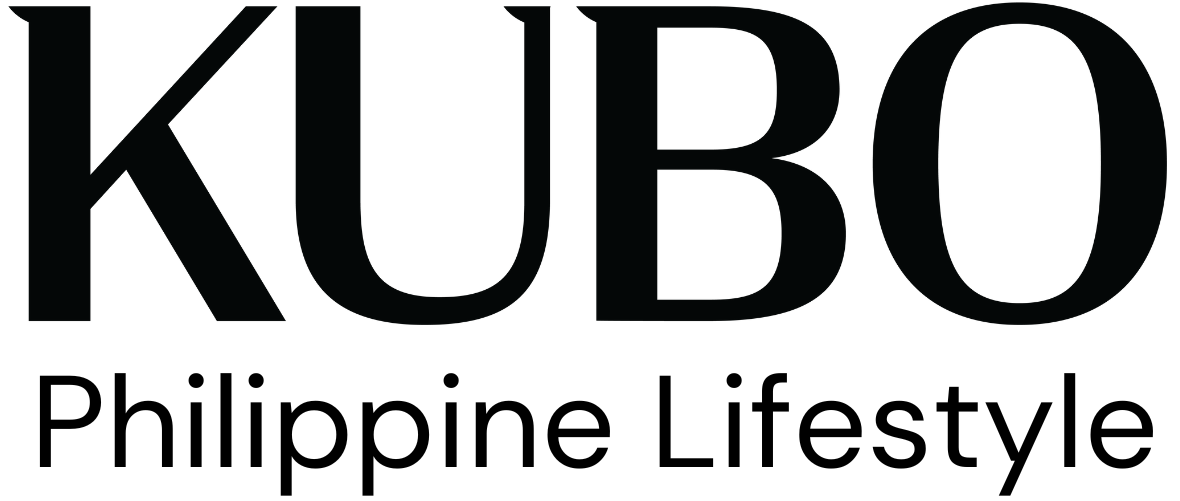It’s the dream of many Filipinos, whether they live in the Philippines or abroad, to set up their own business. We at KUBO know that this is especially true for Filipinos abroad who are hoping to come back home and set up shop, either post-retirement or much earlier than that.
The story of how Paco Magsaysay established ice cream brand Carmen’s Best is a good example of how having lived abroad, coupled with Filipino resilience that’s often tempered by working overseas, can become an advantage when starting one’s own business back in the Philippines.
Working with what he had
Carmen’s Best began as a result of the Magsaysay family farm’s milk surplus in 2007. Selling fresh milk had the pressing issue of having a shorter shelf-life compared to those available in the market, so Paco was urged by his father to brainstorm other ideas on how to sell it off.
They tried to create different dairy products, but “the moment we tried the ice cream that’s when I knew that was it,” Paco narrates. Paco realized it was always that particular dairy product that he sought after in all his travels. “We started offering ice cream from my house. We were looking to sell it like a home-based seller of tapa or longganisa, not in groceries. Yet despite the fact that we were selling okay in the village, it was still not enough to sell all the milk off,” Paco explains. “So we started selling to other places outside the village. Then it just snowballed.”
However, he didn’t want to bump heads with multinational ice cream companies. He decided to target more niche markets, where quality instead of mass appeal was of utmost importance. “One of the things that we kept in mind is that we wanted the product to speak for itself. And, if you notice when you talk to other people, they all remember the first time they ate it,” Paco says. “It’s so memorable that they would start telling their friends and family about it and giving it as gifts.”
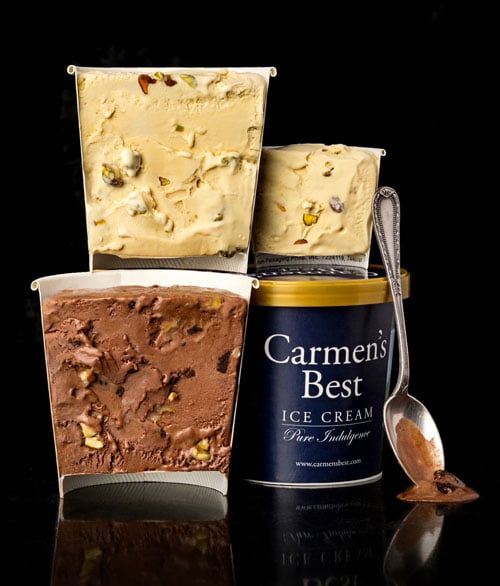
Photo by Neal Oshima
Experiences abroad as his strengths
Starting any kind of business is never an easy endeavor, but especially in a country you didn’t grow up in. Paco started to regret growing up in the United States. “When I first came back, I sort of felt like a fish out of water. I was kind of resenting the fact that I spent too much time abroad. I wished I grew up here. I wished I established ties here. I wished I had memories of growing up here…only to realize that my living abroad was my biggest advantage in growing the business.”
Paco realized his biggest strength lay in what he initially thought was his weakness in the Philippine business landscape: having grown up abroad and traveled to different countries prior to moving back. “Growing up abroad was my biggest advantage because [I was used to] doing those little things that still have to get done when you start a business [but you don’t have the money to start hiring somebody for yet]—I was working jobs that people here would find demeaning, like waiting on tables, cleaning warehouses, or cleaning toilets,” muses Paco.
Looking back on his experiences applying to jobs abroad, he shares, “I remember it was very difficult because my name was not Hispanic or Caucasian. It was actually a big disadvantage for me when trying to get my foot in the door for them to even interview me. I’m used to being rejected; I’m used to people saying no to me, so that doesn’t bother me so much.”
This taught him to find ways to approach things better, which he thinks those planning to start a business can learn from. “I think of ways, ‘How can I make it so that I’ll be able to sit with the potential client longer? Maybe I should chat a little bit about other stuff aside from work.’ Those are the things that should go to mind instead of saying, ‘I’m so devastated. I got rejected three times this morning. I can’t continue.’ Walang mangyayari sa‘yo niyan (nothing will happen to you then). But if you just keep going and plugging and trying, then you start to get one to agree to get ice cream from you. Before you know it, you’re getting two, three, four clients. If you just get a handful of clients that are quite prominent, then it’s easy to keep referring to them,” he shares.
Up until Carmen’s Best’s second year of operation, Paco did most of the grunt work himself while managing a full-time job. Paco made the ice cream in his house, walked around with his cooler full of ice cream, and visited resellers on Saturdays and Sundays. “I was checking up on them. They saw how committed I was to growing this [business]. In dealing with your resellers, you’re more hands on; a bigger company would have a different relationship [while] you’re more understanding and patient, more like partners,” he reflects.
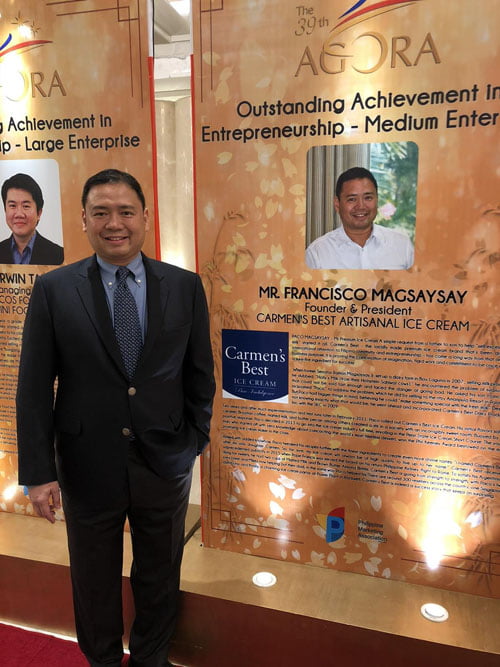
Paco and Carmen’s Best won their first major award, the Agora Award for Outstanding Achievement in Entrepreneurship – Medium Enterprise, from the Philippine Marketing Association in 2018
Paco’s experiences abroad also influenced what was to become the popular flavors of Carmen’s Best, such as Malted Milk, Brazilian Coffee, and Pistachio Almond Fudge. These varieties became the unique selling point of the ice cream brand and set it apart from competitors. “I grew up in the Southern part of the US, so I grew up eating a different kind of ice cream. It was not the queso and macapuno or ube that you would get here, although I love those. The flavors there are not available here [in PH]. We didn’t have the malted milk. We didn’t have butter pecan. I wanted to bring those here.”
He continues, “My travels inspired a lot of the flavors that we offer, such as the Hokey Pokey I tried in New Zealand; the Spanish Turon in Spain, which is an almond ice cream. Every flavor has a story. Sometimes being exposed to different things is good because now you can compare things and you can say, ‘Maybe we can put a different kind of ice cream here.’ And I think I’m able to successfully put those in the menu of Carmen’s Best.”
Filipino pride and family values kept him going
Besides the operational hurdles, Paco encountered resistance to his ice cream because of the pricing. He shares, “Someone once went up to me and said, ‘Ang mahal naman niyan, gawa naman sa Pilipinas.’ (That’s so expensive but it’s just made in the Philippines.) I was taken aback by what she said, so I said, ‘It’s not who mixes the ice cream; it’s the ingredients, and it’s the process. If I’m working in Haagen-Dazs in the US and I’m mixing it, does that mean it’s of lower quality because I’m a Filipino mixing it? What I know is, if you have better ingredients and you do it the right way, then you’ll have a better product regardless of who’s making it.’”
Paco’s primary motivation to keep going with the business, despite all the challenges, resided in the name itself. Though Paco’s competitive spirit was enough to keep things rolling after he started, it was his innate quality of being a Filipino family man that made running the business bearable during the toughest times. “It’s so difficult starting a business from scratch that there are going to be times that you question if you should continue or shut down, and question why you are doing what you’re doing,” Paco explains. “I think that’s where the name played an important role because I felt like I couldn’t let my daughter Carmen down, so I had to keep going.” (Note: Carmen’s Best is named after Paco’s daughter.)
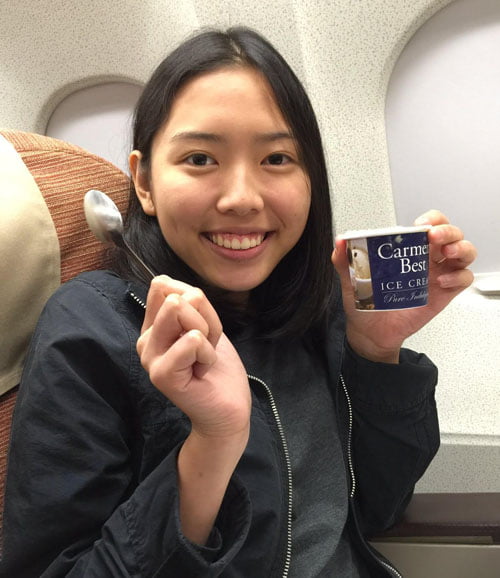
Paco named Carmen’s Best after his eldest daughter, pictured here enjoying a cup of their ice cream.
It also goes back to the relationships he has built. “When it’s from the ground up, the partners and resellers, they’re not just clients anymore. They’re not just business transactions; it’s also like relationships. It’s kind of harder to quit just like that because there are so many people relying on you,” he says.
Paco’s tips for balikbayans who want to start a business in PH
1. Do something you have an actual interest in.
“First and foremost, it’s best to do something you have interest in. You enjoy doing it. [Otherwise,] it’s not gonna be sustainable. It takes so much time and effort to grow a business from scratch. Keep it within your scope of interest.”
2. Embrace the grunt work and long hours.
“People abroad understand working hard, having two to three jobs. If you start a business, you really need to work long hours. You have to do it all. You need to know how to manage your time. Filipinos abroad understand this.
“When you start a business, and of course you’re not making a lot of money right away, you will do a lot more functions in your company because you can’t hire all these people to help run the company. If you do hire one or two people, it’s gonna be specific functions. If you’re lucky, they’ll help you with other parts of the business, but it’s still on you. You’re the founder, you’re the person who started a business, and, even if the people you hired make mistakes, the buck ends with you.
“I remember, if I wasn’t able to hire the right kind of people at Carmen’s Best and we had to close down, the public would say, ‘Paco failed. He had to close his business. It’s not because of this or that.’ I didn’t want something like that to happen. So I tried my best to make it work. If I was going to fail, I don’t want it to be because I lacked effort.”
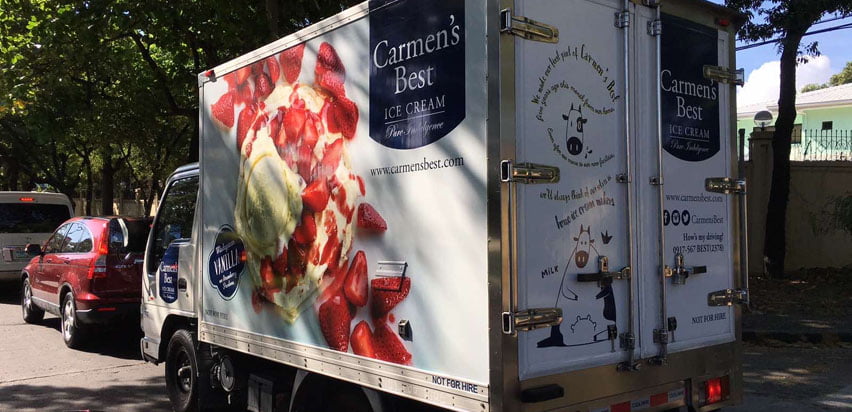
Carmen’s Best uses their ice cream trucks as moving billboards, too. (Photo by Neal Oshima)
3. Bring home something you learned from living abroad and make it your USP.
“I always suggest when you come up with a product or a service, it has to have a unique selling proposition. Filipinos abroad are exposed to different things and culture. Maybe there’s something they can bring back home to the PH. I mean, there was a reason why my first four flavors were salted caramel, butter pecan, Brazilian coffee, and malted milk. I did not come up with the ube macapuno or queso ice cream because that was not the market I was trying to serve. I wanted to serve a market that understood what butter pecan was. So, I was really catering to a different market even by the flavors that I came up with.”
4. Be deliberate about who you want to target.
“I think at the time people found it crazy that I would target the A and B market. It’s like nobody really targets the A and B market because it’s such a small part of the total market. I didn’t want to bump heads with the big guys because these are billion-peso publicly listed companies that have been operating for how many decades. One of the reasons why certain groceries were open to carrying our product was because it was really catering to a different market segment, which meant I didn’t have to be in all the groceries. It helped me in terms of focusing on who to approach, who to deal with. I increased my chances of success.”
